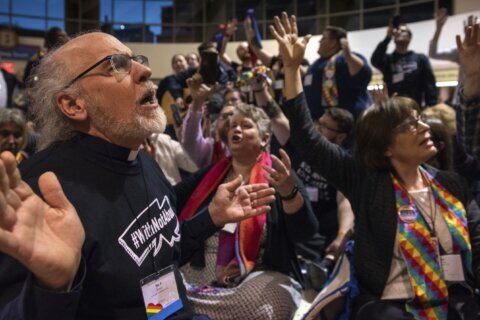THE HAGUE, Netherlands (AP) — Leaders of the four parties that made up the last coalition government in the Netherlands agreed Thursday — more than six months after a general election — to join forces again for another four-year term, leading negotiators said.
The decision moves the drawn-out process of forming a new governing coalition into a new phase that involves sketching out a brief policy blueprint for the next four years and selecting ministers. Only then can a new Dutch government be sworn in by King Willem-Alexander.
Caretaker Prime Minister Mark Rutte, who is expected to lead what would be his fourth government, insisted the next administration would not be more of the same even though the coalition consists of the same four parties: Rutte’s People’s Party for Freedom and Democracy, the centrist D66, the Christian Democrats and the Christian Union.
“There’s a huge amount of work to be done, and I think these parties will have to draw up a program to reflect that,” Rutte said. “It will be a new start, a new culture, with a new program.”
It was not immediately clear how long it would take to complete the next round of talks.
The last government quit in January to take political responsibility for a scandal in which the country’s tax authorities wrongly labeled as fraudsters many families who were claiming child welfare benefits.
It was the latest scandal to hit Rutte’s third Cabinet amid an increasingly tense relationship with lawmakers and calls for a new culture of openness from the government.
Johan Remkes, the official who led coalition talks in recent weeks, said in his final report that five opposition parties also should be invited to play a role in upcoming negotiations about a brief policy blueprint.
After months of on-off talks, the process of forming a workable coalition finally progressed after D66 leader Sigrid Kaag said Thursday she was prepared to begin negotiations to re-form the four-party Cabinet whose resignation led to a March 17 election,
Kaag long ruled out joining a coalition with the Christian Union party due to ideological differences but removed the condition in recent days in an attempt to breathe new life into the ailing talks.
She said she wants an ambitious policy blueprint for the next government.
“This means that the Netherlands will become a climate frontrunner in Europe, that we will make the largest structural investment in education ever and that the Netherlands will take a leading role at the European Union,” Kaag said.
She said her party wants the new coalition to be “more progressive, more generous, more open and more humane.”
But she sounded a note of caution about the next phase of talks.
“Will it work? I do not know,” said Kaag, who resigned as caretaker foreign minister two weeks ago over the chaotic Dutch evacuations from Afghanistan after the Taliban swept to power.
Jesse Klaver, leader of the Green Left opposition party, said the coalition had failed during its last term to tackle crises such as chronic housing shortages, climate change and inequality.
“Why would that be different if the coalition continues?” Klaver tweeted. “What the Netherlands needs is change. This is more of the same.”
Populist anti-Islam lawmaker Geert Wilders slammed Kaag’s decision, saying it was aimed at preventing her party from being punished by voters in the next elections.
Copyright © 2024 The Associated Press. All rights reserved. This material may not be published, broadcast, written or redistributed.







